2014
POPE FRANCIS "IS MY WHOLE HEART REALLY IN IT, OR DO I MERELY MOUTH THE WORDS"
 (Vatican Radio) Pope Francis celebrated Mass on Tuesday morning in the Vatican’s Casa Santa Marta residence. Following the readings of the day, the Holy Father spoke about the proper attitude of the Christian at prayer.
(Vatican Radio) Pope Francis celebrated Mass on Tuesday morning in the Vatican’s Casa Santa Marta residence. Following the readings of the day, the Holy Father spoke about the proper attitude of the Christian at prayer.Reflecting on the episode from the Second Book of Samuel, which was read at Mass, in which “David danced with all his might before the Lord,” Pope Francis recalled that the whole people of Israel were celebrating because the Ark of the Covenant was returning home. He went on to say that David’s prayer of praise, “led him to move beyond all composure,” adding, “this was precisely a prayer of praise.”
Explaining that the passage caused his thoughts to turn to Sarah, Abraham’s wife, who, after giving birth to her son, Isaac, said, “The Lord made me dance with joy.” He said that it is easy to understand a prayer of petition – asking something of the Lord – and prayer of thanksgiving, as well. Even prayer of adoration, he said, “is not so difficult,” to understand. Prayer of praise, however, “We leave aside – it does not come to us so easily [It. Non ci viene così spontanea].”:
“‘But, Father! This is for the Renewal in the Spirit folks, not for all Christians!’ No: prayer of praise is a Christian prayer, for all of us. In the Mass, every day, when we sing the Holy, Holy, Holy ... This is a prayer of praise: we praise God for his greatness, because He is great. We say beautiful things to Him, because we happy for His greatness [It. perché ci piace che sia così]. ‘But, Father! I am not able...I have to...’ Well, you’re able to shout when your team scores a goal, and you are not able to sing praises to the Lord? To come out of your shell ever so slightly to sing [His praise]? Praising God is completely gratis. [In it] we do not ask [Him to give us anything]: we do not express gratitude for anything [He has given]; we praise [Him]!”
We need to pray “whole-heartedly,” he said. “It is also an act of justice, because He is great! He is our God.” David, Pope Franics went on to observe, “was so happy, because the ark was returning, the Lord was returning: his body, too, prayed with that dance.”:
“[Here is] a good question for us to pose to ourselves today: ‘But how am I doing vis à vis prayer of praise? Do I know how to praise the Lord? Do I know how to praise the Lord when I pray the Gloria or the Sanctus? Is my whole heart really in it, or do I merely mouth [the words]. What does David dancing here say to me, and Sarah, dancing for joy? When David enters the city there begins another thing: a party!”
“The joy of praise,” said Pope Francis, “leads us to the joy of the feast - the feast of the family.” The Pope went on to recall how, when David returned to the palace, Michal, the daughter of King Saul, scolded him and asked him if he did not feel ashamed for having danced like that in front of everyone, he, who is the king. Michal “despised David”:
“I wonder sometimes how many times we despise good people in our hearts, good people who praise the Lord as it comes to them, so spontaneously, because they are not cultured, because they do not follow the formalities? [I mean really] despise [them]? The Bible says that, because of this, Michal remained sterile for the rest of her life. What does the Word of God mean, here? [It means] that joy, that the prayer of praise makes us fruitful! Sarah danced in the great moment of her fecundity – at the age of ninety! The fruitfulness that praise of the Lord gives us, the gratuity of praising the Lord: that man or that woman who praises the Lord, who prays praising the Lord, who, when praying the Gloria is filled with joy at doing so, and who, when singing the Sanctus in the Mass rejoices in singing it, is a fruitful person.”
On the other hand, warned Pope Francis, “Those, who are closed in the formality of a prayer that is cold, stingy [It. misurata], might end up as Michal, in the sterility of her formality.” The Pope asked, then, [that we] imagine David dancing, “with all his might before the Lord,” and that, “we think how beautiful it is to make the prayer of praise.” It will do us good, he said, to repeat the words of Psalm 23, which we prayed today: “Lift up your gates, O ye princes, and be ye lifted up, O eternal gates: and the King of Glory shall enter in. Who is this King of Glory? The Lord of hosts, He is the King of Glory.”
Text from Vatican Radio website
OVER 3000 FAMILIES AT CATHEDRAL FOR AUSTRALIA DAY CELEBRATIONS
Catholic Communications, Sydney Archdiocese REPORT:
28 Jan 2014
28 Jan 2014
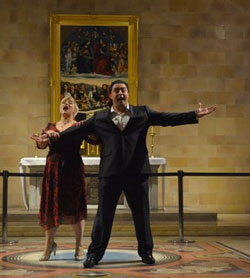
Opera arias by Matt Reardon and Regina Daniel were immensely popular
More than 3000 families, friends and visitors to Sydney enjoyed the Australia Day celebrations at St Mary's Cathedral on Sunday.
At the 10.30 am Mass celebrated by the Archbishop of Sydney it was standing room only. During the Mass a tribute was paid to all those Australians who fought and died in battle with the RSL Corps to Guards laying a wreath in their memory at the Cathedral's Fallen Soldier Memorial.
One of the highlights of the day was the opera recital in the Crypt featuring two of Opera Australia's stars-on-the-rise: coloratura soprano Regina Daniel and tenor Matthew Reardon. Members of the Opera and Arts Support Group Inc the singers were accompanied by Sharolyn Kimorely from the Sydney Conservatorium of Music.
Other highlights included two recitals by St Mary Cathedral's Director of Music, Thomas Wilson. Playing the Cathedral's famous Letourneau 3600 pipe-organ, the interntionally-acclaimed organist and musician, attracted a big crowd for each of his two performances.
According to Helen Hofman, St Mary's Cathedral's House and Events Manager, Australia Day 2014 was a huge success and is now very much a loved and anticipated tradition.
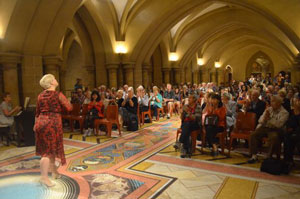
Opera's coloratura soprano Regina Daniel performed to a packed audience in the Crypt
Tours of the Cathedral's bell tower which houses the largest set of bells in Australia are always popular, but this year were booked out within the 30 minutes.
The history tours of the Cathedral and the Crypt were also in demand and filled to capacity.
Led by volunteers who are also experts on the history of the Cathedral and its treasures, Sydneysiders had a chance to learn about the earliest days of the Catholic Church in Australia, the provenance and stories behind many of the Cathedral's priceless statues, sculptures, paintings and other artworks, as well as view vestments worn by Sydney's first Archbishop, John Bede Polding and early chalices dating back to the days when Sydney was a still a penal colony.
Photography by Roberta Mayanah
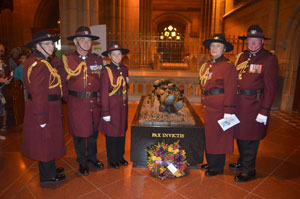
RSL Corps of Guards beside the Cathedral's Fallen Soldier Memorial
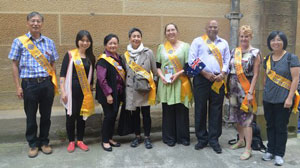
St Mary's Cathedral relies on many dedicated volunteers each Australia Day
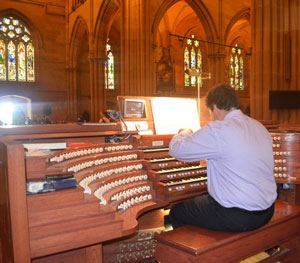
The organ recitals by the Cathedral's Director of Music, Thomas Wilson were a highlight
SHARED FROM ARCHDIOCESE OF SYDNEY
OVER 40 PEOPLE KILLED IN NIGERIA - 18 KILLED AT CHURCH - AFRICA
 27 JANUARY 2014 Photo: Premium Times
27 JANUARY 2014 Photo: Premium Times
ALL AFRICA REPORT: Witnesses say dozens of people are dead after suspected Boko Haram militants attacked two villages in northeastern Nigeria. A local reporter told VOA's Hausa Service that more than 40 people were killed and another 25 were injured late Sunday when assailants attacked the village of Kawori in Borno state. The attackers set fire to homes, a market, and places of worship in the village. In another incident, gunmen opened fire at a church Sunday morning in Chakawa, in Adamawa state. A local journalist said that two policemen and 18 civilians were killed. Borno and Adamawa are two of the three states where Nigerian President Goodluck Jonathan declared a state of emergency last May as part of efforts to fight Boko Haram. The Islamist militant group is blamed for thousands of deaths since launching its uprising against the government in 2009. Jonathan replaced his chief of defense and the heads of the army, navy and air forces last week. No reason was given for the moves, but the army has struggled to stop attacks by Boko Haram.
SHARED FROM ALL AFRICA COM
SHARED FROM ALL AFRICA COM
POPE FRANCIS "TO CARRY PEOPLE FORWARD, TO HELP PEOPLE, TO LIVE IN THE SERVICE OF PEOPLE"
 (Vatican Radio) Pope Francis celebrated Mass on Monday morning in the chapel of the Vatican’s Casa Santa Marta residence. In remarks following the readings of the day, the Holy Father spoke of the Church as a divinely ordained institution in which some individuals – the men who answer the call to become priests and bishops – are specially anointed to serve the people of God. The Pope thanked the many holy priests who give their lives in the anonymity of their daily service.
(Vatican Radio) Pope Francis celebrated Mass on Monday morning in the chapel of the Vatican’s Casa Santa Marta residence. In remarks following the readings of the day, the Holy Father spoke of the Church as a divinely ordained institution in which some individuals – the men who answer the call to become priests and bishops – are specially anointed to serve the people of God. The Pope thanked the many holy priests who give their lives in the anonymity of their daily service. Commenting on the first reading of the day, which speaks of the tribes of Israel that anoint David as their king, the Pope explained the significance of spiritual anointing, saying, “Without this anointing, David would have been only the head,” of the, “company” of a “political society, which was the Kingdom of Israel” He would have been a mere, “political organizer.” Instead, “After the anointing , the Spirit of the Lord,” descends upon David and stays with him. Scripture says that David continued to grow in power, and that the Lord was with him. “This,” said Pope Francis, “is precisely the difference anointing makes.” The anointed one is a person chosen by the Lord. So it is in the Church for bishops and priests:
“The bishops are elected not only to conduct an organization, which is called the particular Church. They are anointed: they have the anointing and the Spirit of the Lord is with them. All the bishops are sinners, every one. Still, we are anointed. We all want to be more holy every day, more faithful to this anointing. The person of the bishop is the thing that [constitutes] a Church [as such], in the name of Jesus Christ – because he is anointed, not because he was voted by the majority. It is in this anointing that a particular Church has its strength. Because they take part [in the bishop’s mission of service] priests are anointed, as well.”
Pope Francis went on to say that anointing brings bishops and priests closer to the Lord and gives them the joy and strength, “To carry [their] people forward, to help [their] people, to live in the service of [their] people.” Anointing gives the joy of feeling oneself “chosen by the Lord, watched by the Lord, with that love with which the Lord looks upon all of us.” Thus, “When we think of bishops and priests, we must think of them in this way: [as] anointed ones.”:
“On the contrary, it is impossible to understand – not only – it is impossible to explain how the Church could continue under merely human strength. This diocese goes forward because it has a holy people, many things, and also an anointed one who leads, who helps it to grow. This parish progresses because it has many organizations, many things, but it also has a priest, who carries the parish forward. We in history know but a small part - though how many holy bishops, how many priests, how many holy priests have given their lives in the service of the diocese, the parish – how many people have received the power of faith, the power of love, hope [itself] from these anonymous pastors? We do not know: there are so many.”
They are many, explained Pope Francis, “The parish priests of the country or the city, who, with their anointing have given strength the people, who have passed on the teaching of the faith, have given the sacraments: [in a word], holiness.”:
“‘But , Father, I have read in a newspaper that a bishop has done such a thing, or a priest who has done this thing.’ Oh yes, I read it, too. Tell me, though: do the papers carry news of what great charity so many priests, so many priests in so many parishes of the city and the countryside, perform? Of the great work they do in carrying their people forward? No? This is not news. It is the same as always: a single falling tree makes more noise than a forest that grows. Today, thinking about this anointing of David, it will do us good to think of our brave, holy , good , faithful bishops and priests, and pray for them. We are here today thanks to them.”
Text from Vatican Radio website
"THE HORRORS OF THE HOLOCAUST MUST NEVER BE REPEATED" POPE FRANCIS
 (Vatican Radio) Pope Francis has written a letter to his friend Rabbi Abraham Skorka of Buenos Aires on the occasion of Holocaust Memorial Day which is marked on January 27th. The letter will be read out Monday evening at a concert in Rome entitled “Violins of Hope”.
(Vatican Radio) Pope Francis has written a letter to his friend Rabbi Abraham Skorka of Buenos Aires on the occasion of Holocaust Memorial Day which is marked on January 27th. The letter will be read out Monday evening at a concert in Rome entitled “Violins of Hope”.In the hand written letter to Rabbi Abraham Skorka, the Pope the describes the Holocaust as a horror and a disgrace to humanity that must never be repeated. It will be read out on Monday evening at a concert at Rome’s Parco della Musica entitled “Violins of Hope” commemorating Holocaust Memorial Day.
The Pope writes that the audience will be hearing pieces including works by Barber, Vivaldi and Beethoven, but he stresses that behind the sound of music, the hearts of each of those present will be able to make out the silent sound of tears.
To add to the poignancy of the evening, twelve violins that survived the Holocaust will be played together for the first time at the concert. The instruments were discovered and restored by Israeli violin maker Amnon Weinstein.
Among them is a violin that accompanied the deportees to the gas chambers of Auschwitz and another one thrown from a train en route to the camp.
Text from Vatican Radio website
PRIME MINISTER OF UKRAINE RESIGNS TODAY - AZAROV RESIGNS

Russia's President Vladimir Putin (L) shakes hands with Ukrainian Prime Minister Mykola Azarov before a meeting of the Supreme Eurasian Economic Council at the Kremlin in Moscow on Dec. 24. Azarov submitted his resignation under press on Jan. 28.
http://www.kyivpost.com/content/politics/azarov-resigns-as-parliament-session-gets-under-way-335719.html
TODAY'S SAINT : JAN. 28 : ST. THOMAS AQUINAS
St. Thomas Aquinas
CONFESSOR, DOCTOR OF THE CHURCH
Feast: January 28
 Information:
|
The great outlines and all the important events of his life are known, but biographers differ as to some details and dates. Death prevented Henry Denifle from executing his project of writing a critical life of the saint. Denifle's friend and pupil, Dominic Prummer, O.P., professor of theology in the University of Fribourg, Switzerland, has taken up the work and is publishing the "Fontes Vitae S. Thomae Aquinatis, notis historicis et criticis illustrati"; and the first fascicle (Toulouse, 1911) has appeared, giving the life of St. Thomas by Peter Calo (1300) now published for the first time. From Tolomeo of Lucca . . . we learn that at the time of the saint's death there was a doubt about his exact age (Prummer, op. cit., 45). The end of 1225 is usually assigned as the time of his birth. Father Prummer, on the authority of Calo, thinks 1227 is the more probable date (op. cit., 28). All agree that he died in 1274.
Landulph, his father, was Count of Aquino, Theodora, his mother, Countess of Teano. His family was related to the Emperors Henry VI and Frederick II, and to the Kings of Aragon, Castile, and France. Calo relates that a holy hermit foretold his career, saying to Theodora before his birth: "He will enter the Order of Friars Preachers, and so great will be his learning and sanctity that in his day no one will be found to equal him" (Prummer, op. cit., 18). At the age of five, according to the custom of the times, he was sent to receive his first training from the Benedictine monks of Monte Cassino. Diligent in study, he was thus early noted as being meditative and devoted to prayer, and his preceptor was surprised at hearing the child ask frequently: "What is God?" About the year 1236 he was sent to the University of Naples. Calo says that the change was made at the instance of the Abbot of Monte Cassino, who wrote to Thomas's father that a boy of such talents should not be left in obscurity (Prummer, op. cit., 20). At Naples his preceptors were Pietro Martini and Petrus Hibernus. The chronicler says that he soon surpassed Martini a grammar, and he was then given over to Peter of Ireland, who trained him in logic and the natural sciences. The customs of the times divided the liberal arts into two courses: the Trivium, embracing grammar, logic, and rhetoric; the Quadrivium, comprising music, mathematics, geometry, and astronomy . . . . Thomas could repeat the lessons with more depth and lucidity than his masters displayed. The youth's heart had remained pure amidst the corruption with which he was surrounded, and he resolved to embrace the religious life.
Some time between 1240 and August, 1243, he received the habit of the Order of St. Dominic, being attracted and directed by John of St. Julian, a noted preacher of the convent of Naples. The city wondered that such a noble young man should don the garb of poor friar. His mother, with mingled feelings of joy and sorrow, hastened to Naples to see her son. The Dominicans, fearing she would take him away, sent him to Rome, his ultimate destination being Paris or Cologne. At the instance of Theodora, Thomas's brothers, who were soldiers under the Emperor Frederick, captured the novice near the town of Aquapendente and confined him in the fortress of San Giovanni at Rocca Secca. Here he was detained nearly two years, his parents, brothers, and Sisters endeavouring by various means to destroy his vocation. The brothers even laid snares for his virtue, but the pure-minded novice drove the temptress from his room with a brand which he snatched from the fire. Towards the end of his life, St. Thomas confided to his faithful friend and companion, Reginald of Piperno, the secret of a remarkable favour received at this time. When the temptress had been driven from his chamber, he knelt and most earnestly implored God to grant him integrity of mind and body. He fell into a gentle sleep, and, as he slept, two angels appeared to assure him that his prayer had been heard. They then girded him about with a white girdle, saying: "We gird thee with the girdle of perpetual virginity." And from that day forward he never experienced the slightest motions of concupiscence.
The time spent in captivity was not lost. His mother relented somewhat, after the first burst of anger and grief; the Dominicans were allowed to provide him with new habits, and through the kind offices of his sister he procured some books—the Holy Scriptures, Aristotle's Metaphysics, and the "Sentences" of Peter Lombard. After eighteen months or two years spent in prison, either because his mother saw that the hermit's prophecy would eventually be fulfilled or because his brothers feared the threats of Innocent IV and Frederick II, he was set at liberty, being lowered in a basket into the arms of the Dominicans, who were delighted to find that during his captivity "he had made as much progress as if he had been in a
In 1245 Albert was sent to Paris, and Thomas accompanied him as a student. In 1248 both returned to Cologne. Albert had been appointed regent of the new
In due time he was ordered to prepare himself to obtain the degree of Doctor in Theology from the University of Paris, but the conferring of the degree was postponed, owing to a dispute between the university and the friars. The conflict, originally a dispute between the university and the civic authorities, arose from the slaying of one of the students and the wounding of three others by the city guard. The university, jealous of its autonomy, demanded satisfaction, which was refused. The doctors closed their schools, solemnly swore that they would not reopen them until their demands were granted, and decreed that in future no one should be admitted to the degree of Doctor unless he would take an oath to follow the same line of conduct under similar circumstances. The Dominicans and Franciscans, who had continued to teach in their schools, refused to take the prescribed oath, and from this there arose a bitter conflict which was at its height when St. Thomas and St. Bonaventure were ready to be presented for their degrees. William of St. Amour extended the dispute beyond the original question, violently attacked the Friars, of whom he was evidently jealous, and denied their right to occupy chairs in the university. Against his book, "De periculis novissimorum temporum" (The Perils of the Last Times), St. Thomas wrote a treatise "Contra impugnantes religionem", an apology for the religious orders (Touron, op. cit., II, cc. vii sqq.). The book of William of St. Amour was condemned by Alexander IV at Anagni, 5 October, 1256, and the pope gave orders that the mendicant friars should be admitted to the doctorate.
About this time St. Thomas also combated a dangerous book, "The Eternal Gospel" (Touron, op. cit., II, cxii). The university authorities did not obey immediately; the influence of St. Louis IX and eleven papal Briefs were required before peace was firmly established, and St. Thomas was admitted to the degree of Doctor in Theology. The date of his promotion, as given by many biographers, was 23 October, 1257. His theme was "The Majesty of Christ". His text, "Thou waterest the hills from thy upper rooms: the earth shall be filled with the fruit of thy works" (Ps. ciii, 13), said to have been suggested by a heavenly visitor, seems to have been prophetic of his career. A tradition says that St. Bonaventure and St. Thomas received the doctorate on the same day, and that there was a contest of humility between the two friends as to which should be promoted first. From this time St. Thomas's life may be summed up in a few words: praying, preaching, teaching, writing, journeying. Men were more anxious to hear him than they had been to bear Albert, whom St. Thomas surpassed in accuracy, lucidity, brevity, and power of exposition, if not in universality of knowledge. Paris claimed him as her own; the popes wished to have him near them; the
Yielding to the requests of his brethren, he on several occasions took part in the deliberations of the general chapters of the order. One of these chapters was held in London in 1263. In another held at Valenciennes (1259) he collaborated with Albertus Magnus and Peter of Tarentasia (afterwards Pope Innocent V) in formulating a system of studies which is substantially preserved to this day in the
The "Summa theologica" had been completed only as far as the ninetieth question of the third part (De partibus poenitentiae). Thomas began his immediate preparation for death. Gregory X, having convoked a general council, to open at Lyons on 1 May, 1274, invited St. Thomas and St. Bonaventure to take part in the deliberations, commanding the former to bring to the council his treatise "Contra errores Graecorum" (Against the Errors of the Greeks). He tried to obey, setting out on foot in January, 1274, but strength failed him; he fell to the ground near Terracina, whence he was conducted to the Castle of Maienza the home of his niece the Countess Francesca Ceccano. The Cistercian monks of Fossa Nuova pressed him to accept their hospitality, and he was conveyed to their monastery, on entering which he whispered to his companion: "This is my rest for ever and ever: here will I dwell, for I have chosen it" (Ps. cxxxi, 14). When Father Reginald urged him to remain at the castle, the saint replied: "If the Lord wishes to take me away, it is better that I be found in a religious house than in the dwelling of a lay person." The Cistercians were so kind and attentive that Thomas's humility was alarmed. "Whence comes this honour", he exclaimed, "that servants of God should carry wood for my fire!" At the urgent request of the monks he dictated a brief commentary on the Canticle of Canticles.
The end was near; extreme unction was administered. When the Sacred Viaticum was brought into the room he pronounced the following act of faith: "If in this world there be any knowledge of this sacrament stronger than that of faith, I wish now to use it in affirming that I firmly believe and know as certain that Jesus Christ, True God and True Man, Son of God and Son of the Virgin Mary, is in this Sacrament." Then he added: "I receive Thee, the price of my redemption, for Whose love I have watched, studied, and laboured. Thee have I preached; Thee have I taught. Never have I said anything against Thee: if anything was not well said, that is to be attributed to my ignorance. Neither do I wish to be obstinate in my opinions, but if I have written anything erroneous concerning this sacrament or other matters, I submit all to the judgment and correction of the Holy Roman Church, in whose obedience I now pass from this life" (Prummer, op. cit., p. 45). He died on 7 March, 1274. Numerous miracles attested his sanctity, and he was canonized by John XXII, 18 July, 1323. The monks of Fossa Nuova were anxious to keep his sacred remains, but by order of Urban V the body was given to his Dominican brethren, and was solemnly translated to the Dominican church at Toulouse, 28 January, 1369. A magnificent shrine erected in 1628 was destroyed during the French Revolution, and the body was removed to the Church of St. Sernin, where it now reposes in a sarcophagus of gold and silver, which was solemnly blessed by Cardinal Desprez on 24 July, 1878. The chief bone of his left arm is preserved in the cathedral of Naples. The right arm, bestowed on the University of Paris, and originally kept in the St. Thomas's Chapel of the Dominican church, is now preserved in the Dominican Church of S. Maria Sopra Minerva in Rome, whither it was transferred during the French Revolution.
A description of the saint as he appeared in life is given by Calo (Prummer, op. cit., p. 401), who says that his features corresponded with the greatness of his soul. He was of lofty stature and of heavy build, but straight and well proportioned. His complexion was "like the colour of new wheat": his head was large and well shaped, and he was slightly bald. All portraits represent him as noble, meditative, gentle yet strong. St. Pius V proclaimed St. Thomas a Doctor of the Universal Church in the year 1567. In the Encyclical "Aeterni Patris", of 4 August, 1879, on the restoration of Christian philosophy, Leo XIII declared him "the prince and master of all Scholastic doctors". The same illustrious pontiff, by a Brief dated 4 August, 1880, designated him patron of all Catholic universities, academies, colleges, and schools throughout the world. |
SOURCE: http://www.ewtn.com/saintsHoly/saints/T/stthomasaquinas.asp#ixzz1kj81cQFC
